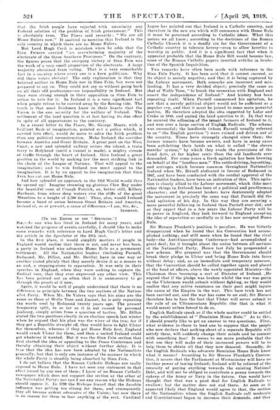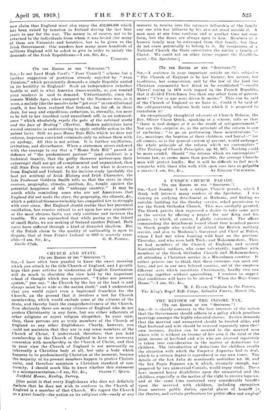(To TEL EDITOR OF THE SPECTATOR:1
Sia,—As one who has lived in Ireland for many years, and watched the progress of events carefully, I should like to make some remarks with reference to Lord Hugh Cecil's letter and the article in the Spectator of the 19th inst.
In the first place, it would simplify matters if people in Englaud would realise that there is not, and never has been, a party in Ireland who advocate Home Rule as a permanent t,ettlement. All the Nationalist leaders (including Parnell, Redmond, Mr. Dillon, and Mr. Devlin) have in one way or another stated plainly that they merely desire it as a means to an end, a stepping-stone to separation. It was only in their speeches in England, when they were seeking to capture the Radical vote, that they ever expressed any other view. This las been pointed out so often that it is unnecessary to go through the proofs of it now.'
Again, it would be well if people understood that there is no difference in principle between the two sections of the Nation- alist Party. When Sir. De Valera says that his aims are the same as those of Wolfe Tone and Emmet, he is only repeating the words used by Redmond twenty years ago. The present temporary split, in so far as it is not caused by personal jealousy, simply arises from a question of tactics. Mr. Dillon stated the two positions clearly in an election speech last winter when he argued that his plan was the wiser of the two; for if they got a Republic straight off, they would have to fight Ulster for themselves, whereas if they got Home Rule first, England would crush 'Ulster for them, and then a united Ireland could get whatever it wanted. But it was the Sinn Feb section that first started the idea of appealing to the Peace Conference and thereby obtaining their object without further delay. It is true that the idea has now been adopted by the Nationalists generally; but that is only one instance of the manner in which the whole Party is steadily being absorbed by Simi Fein.
I do not believe that the Roman Catholic Bishops are really opposed to Home Rule. I have not seen any statement to that effect issued by any one of them; I know of no Roman Catholic newspaper which does not support tine section or the other of the Nationalist Party; nor can I see any reason why the'Bishops should oppose it. In 1799 the Bishops feared that the Jacobin influence was getting too strong for them, and consequently they all became ardent advocates of the Union; but now there is no reason for them to fear anything of the sort. Cardinal Logue has pointed out that Ireland is a Catholic country, and therefore in the new era which will commence with Home Rule it must be governed according to Catholic ideas. What this
means we all know; according to the doctrines of the Roman Catholic Church it is a deadly *sin for the Government of a
Catholic country to tolerate heresy—even to allow heretics to worship in public. And it is a significant fact that when it appeared probable that the Home Rule Bill would become law, some of the Roman Catholic papers inserted articles in lauda- tion of the Spanish Inquisition.
Two remarks have often been made with reference-to the Sinn Fein Party. It has been said that it cannot succeed, as
its object is merely negative; and that it is being captured by the Labour movement. Both remarks are incorrect and mis- leading. It has a very decided object; precisely the same as that of Wolfe Tone, " to break the connexion with England and assert the independence of Ireland." And history has been repeating itself. When Parnell commenced his agitation, he saw that a merely political object would not be sufficient as a popular cry, and that it must be joined to some more powerful motive. He therefore adopted the idea suggested by Lalor and Croke in 1898, and united the land question to it. In that way he secured the adhesion of the tenant farmers of Ireland to it, and won over a large section of English Radicals. The scheme was successful; the landlords (whom Parnell usually referred to as " the English garrison") were ruined and driven out of the country. Times have strangely changed since then; the former tenants have become owners, and have in many cases been sub-letting their lands on what is called "the eleven months' system," by which they evade the provisions of the Land Acts, at far higher rents than the old landlords ever demanded. For some years a fresh agitation has been brewing on behalf of the "landless men." The cattle-driving, boycotting, and outrages which became common throughout Nationalist Ireland when Mr. Birrell abdicated in favour of Redmond in 1907, and have been conducted with the cordial approval of the Nationalist leaders, have been an indication of this. This agita- tion is closely allied to the Labour movement, which (like most other things in Ireland) has been of a political and pro-German character; and the present leaders have dexterously adopted the movement in precisely the same way that Parnell did the land agitation of his day. In this way they are securing a more powerful following in Ireland than Parnell ever did; and as they expect that in a few years the Labour Party will be in power in Englund, they look forward to England accepting the idea of separation as cordially as it has now accepted Home Rule.
Sir Horace Plunkett's position is peculiar. He was bitterly disappointed when he found that his Convection had accom- plished nothing; and still more when he found that the rival body—the Anti-Conscription Conference—had accomplished a great deal; for it brought about the union between all sections of the Nationalist Party. Hence last July he propounded a new scheme. His proposal was that the GoVernment should break their pledge to Ulster and bring Home Rule into force without delay; and, as an immediate and temporary measure, that the Convention should be called together again and placed at the head of affairs, above the newly appointed Ministry—the Chairman thus becoming a sort of Dietator of Ireland. ,He argued that if the 1iledge was broken whilst the war was goirg on the Ulstermen would submit without fighting, as they would realize that any active resistance on their part might injure the cause of the Empire in the war. This base trick has not been carried out, and the war has come to an end; Sir Horace therefore has to face the fact that Ulster will never submit to the rule of an Ultramontane Republic (for that is what it would mean) unless forced to do so.
English Radicals speak as if the whole matter could be settled by the establishment of "Dominion Home Rule." As to this, I should greatly like to get an answer to two questions. First, what evidence is-there to lead one to suppose that the people who now declare that nothing short of a separate Republic will satisfy them, will suddenly change their minds and be content with something less? It seems to me more probable that the first use they will make of their increased powers will be to help them to obtain all that they now demand. Secondly, do the English Radicals who advocate Dominion Home Rule knew what it means? According to Sir Horace Plunkett's Conven- tion, it means that the Parliament at Westminster will have no further power of taxing Ireland; Ireland will be relieved of the necessity of paying anything towards the existing National Debt, and will not be obliged to contribute a penny towards the upkeep of the Army or Navy in the future. One would have thought that that was a goad deal for English Radicals to swallow; but the matter does not end there. As emu as it appeared likely that England would agree to that, the section of the Nationalists whom the English Radicals call moderate and Constitutional began to increase their demands. and they now claim that England must alto repay the £52,000,000 which has'been raised by taxation in Ireland during the last four years to pay for the war. The money is of course, not to be returned to the individuals from whom it was levied (for many of them are Unionists and heretics), but to be given to the Irish Government. One wonders how many more hundreds of millions England will be asked to give in order to satisfy the demands of the Irish Republicans.—I am, Sir, &c., Irmoxisr.







































 Previous page
Previous page